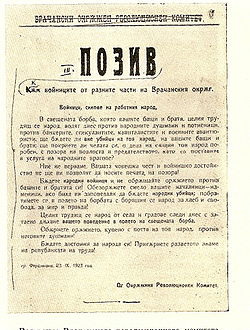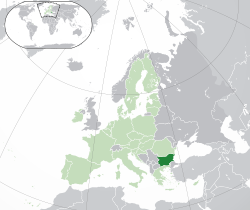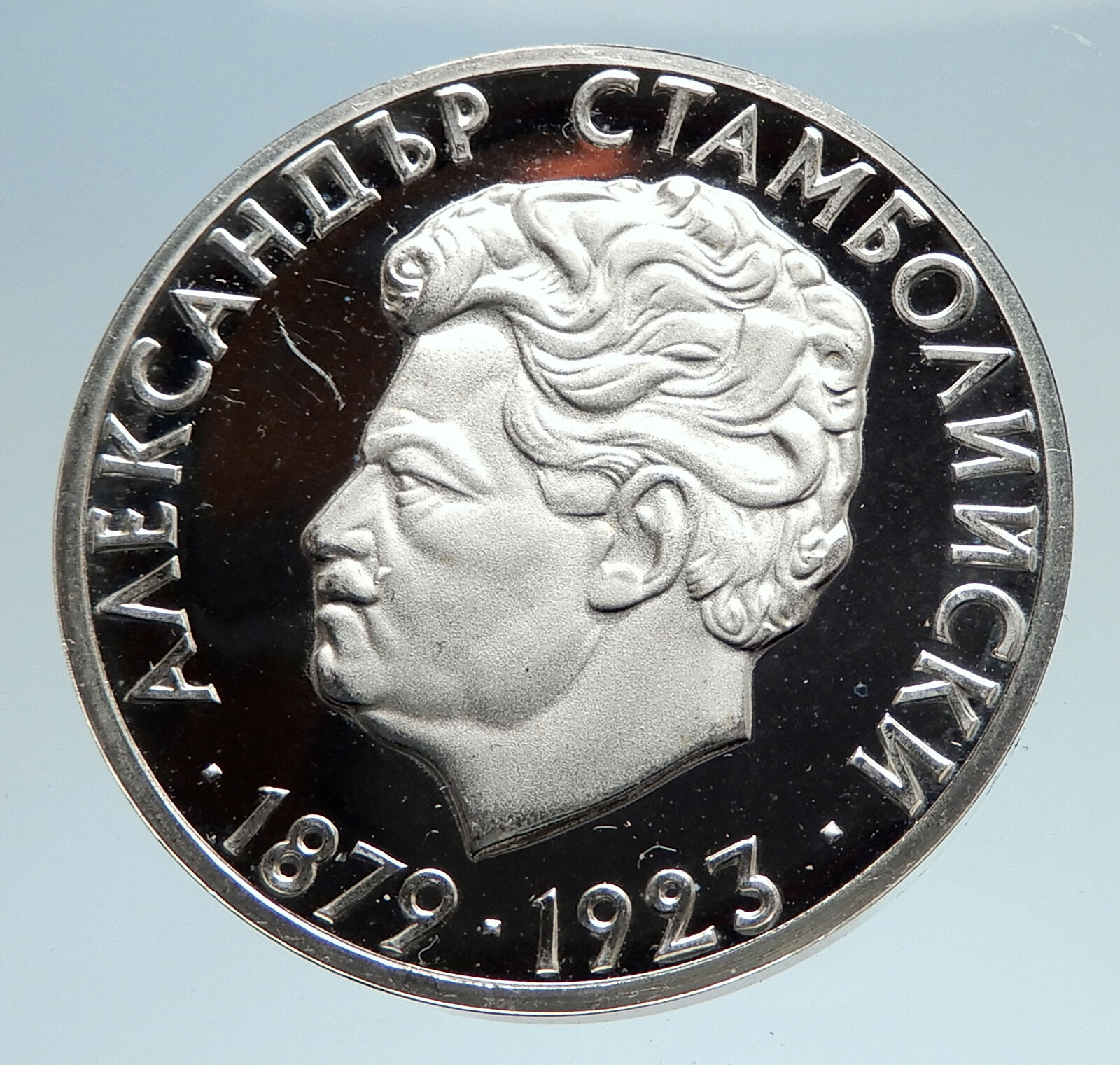|
Bulgaria
50th Anniversary – Anti-Fascist Uprising of September 9, 1923
1973 Proof Silver 10 Leva 36mm (20.50 grams) 0.900 Silver (0.5932 oz. ASW)
Reference: KM# 83 | Engravers: Petar Kutsarov, Georgi Baldzhiev
НАРОДНА РЕПУБЛИКА БЪЛГАРИЯ ПЕТ ЛЕВА 1973, Coat of arms of People’s Republic of Bulgaria.
СЕПТЕМВРИЙСКО АНТИФАШИСТКО ВЪСТАНИЕ 1923, Soldiers.
You are bidding on the exact item pictured, provided with a Certificate of Authenticity and Lifetime Guarantee of Authenticity.
 The September Uprising (Bulgarian: Септемврийско въстание, Septemvriysko vastanie) was an armed insurgency staged in September 1923 by the Bulgarian Communist Party (BCP) under Comintern pressure and attempted to overthrow Alexander Tsankov’s new government of Bulgaria that had come to power with the coup d’état of 9 June. Besides its communist base, the uprising was also supported by agrarians and anarchists. The uprising’s goal was the “establishment of a government of workers and peasants” in Bulgaria. The September Uprising (Bulgarian: Септемврийско въстание, Septemvriysko vastanie) was an armed insurgency staged in September 1923 by the Bulgarian Communist Party (BCP) under Comintern pressure and attempted to overthrow Alexander Tsankov’s new government of Bulgaria that had come to power with the coup d’état of 9 June. Besides its communist base, the uprising was also supported by agrarians and anarchists. The uprising’s goal was the “establishment of a government of workers and peasants” in Bulgaria.
The Bulgarian Communist Party leaders took up a neutral position on the 9 June coup d’état and the subsequent June Uprising because it regarded what was happening in the country as “struggle for power between the urban and rural bourgeoisie”. This position was provoked by the belief of the party’s older leaders, headed by Dimitar Blagoev and Todor Lukanov, that there were no ripe conditions for a revolution in Bulgaria yet.
At the same time, a number of party organizations in the country proclaimed their support for counteraction to the coup d’état, with some even joining the June Uprising. Bulgarian Comintern General Secretary Vasil Kolarov sent a telegram to the BCP (Narrow Socialists) leadership, advising them to “act in determination, even together with Stamboliyski”. However, no common BCP measures in support of the June Uprising were taken in the long run.
In early August 1923, a plenary session of the BCP (Narrow Socialists) Central Committee was called. During the session, the young and radical party activists, headed by Georgi Dimitrov and Vasil Kolarov, backed by the Comintern, prevailed in support of the organization of a new uprising.
The government took precautions to prevent the uprising, arresting more than 2,000 noted BCP activists on 12 September 1923. As a reaction to the arrests, the uprising broke out without plan in isolated areas, initially around Kazanlak. On 20 September, a BCP Central Committee meeting was held, during which a decision was reached to proclaim the uprising on the eve of 23 September, despite opposition by the supporters of legal activity. The plan involved a mass uprising around Vratsa followed by the formation of an organized militia which would capture the capital Sofia.

Bulgaria (Bulgarian: България, tr. Bǎlgariya), officially the Republic of Bulgaria (Bulgarian: Република България, tr. Republika Bǎlgariya, IPA: [rɛˈpublikɐ bɐɫˈɡarijɐ]), is a country in southeastern Europe. It is bordered by Romania to the north, Serbia and Macedonia to the west, Greece and Turkey to the south, and the Black Sea to the east. With a territory of 110,994 square kilometres (42,855 sq mi), Bulgaria is Europe’s 16th-largest country.
 Organised prehistoric cultures began developing on current Bulgarian lands during the Neolithic period. Its ancient history saw the presence of the Thracians, Ancient Greeks, Persians, Celts, Romans, Goths, Alans and Huns. The emergence of a unified Bulgarian state dates back to the establishment of the First Bulgarian Empire in 681 AD, which dominated most of the Balkans and functioned as a cultural hub for Slavs during the Middle Ages. With the downfall of the Second Bulgarian Empire in 1396, its territories came under Ottoman rule for nearly five centuries. The Russo-Turkish War of 1877-78 led to the formation of the Third Bulgarian State. The following years saw several conflicts with its neighbours, which prompted Bulgaria to align with Germany in both world wars. In 1946 it became a one-party socialist state as part of the Soviet-led Eastern Bloc. In December 1989 the ruling Communist Party allowed multi-party elections, which subsequently led to Bulgaria’s transition into a democracy and a market-based economy. Organised prehistoric cultures began developing on current Bulgarian lands during the Neolithic period. Its ancient history saw the presence of the Thracians, Ancient Greeks, Persians, Celts, Romans, Goths, Alans and Huns. The emergence of a unified Bulgarian state dates back to the establishment of the First Bulgarian Empire in 681 AD, which dominated most of the Balkans and functioned as a cultural hub for Slavs during the Middle Ages. With the downfall of the Second Bulgarian Empire in 1396, its territories came under Ottoman rule for nearly five centuries. The Russo-Turkish War of 1877-78 led to the formation of the Third Bulgarian State. The following years saw several conflicts with its neighbours, which prompted Bulgaria to align with Germany in both world wars. In 1946 it became a one-party socialist state as part of the Soviet-led Eastern Bloc. In December 1989 the ruling Communist Party allowed multi-party elections, which subsequently led to Bulgaria’s transition into a democracy and a market-based economy.

Bulgaria’s population of 7.2 million people is predominantly urbanised and mainly concentrated in the administrative centres of its 28 provinces. Most commercial and cultural activities are centred on the capital and largest city, Sofia. The strongest sectors of the economy are heavy industry, power engineering, and agriculture, all of which rely on local natural resources.
The country’s current political structure dates to the adoption of a democratic constitution in 1991. Bulgaria is a unitary parliamentary republic with a high degree of political, administrative, and economic centralisation. It is a member of the European Union, NATO, and the Council of Europe; a founding state of the Organization for Security and Co-operation in Europe (OSCE); and has taken a seat at the UN Security Council three times.
|




 The September Uprising (Bulgarian: Септемврийско въстание, Septemvriysko vastanie) was an armed insurgency staged in September 1923 by the Bulgarian Communist Party (BCP) under Comintern pressure and attempted to overthrow Alexander Tsankov’s new government of Bulgaria that had come to power with the coup d’état of 9 June. Besides its communist base, the uprising was also supported by agrarians and anarchists. The uprising’s goal was the “establishment of a government of workers and peasants” in Bulgaria.
The September Uprising (Bulgarian: Септемврийско въстание, Septemvriysko vastanie) was an armed insurgency staged in September 1923 by the Bulgarian Communist Party (BCP) under Comintern pressure and attempted to overthrow Alexander Tsankov’s new government of Bulgaria that had come to power with the coup d’état of 9 June. Besides its communist base, the uprising was also supported by agrarians and anarchists. The uprising’s goal was the “establishment of a government of workers and peasants” in Bulgaria.
 Organised prehistoric cultures began developing on current Bulgarian lands during the Neolithic period. Its ancient history saw the presence of the Thracians, Ancient Greeks, Persians, Celts, Romans, Goths, Alans and Huns. The emergence of a unified Bulgarian state dates back to the establishment of the First Bulgarian Empire in 681 AD, which dominated most of the Balkans and functioned as a cultural hub for Slavs during the Middle Ages. With the downfall of the Second Bulgarian Empire in 1396, its territories came under Ottoman rule for nearly five centuries. The Russo-Turkish War of 1877-78 led to the formation of the Third Bulgarian State. The following years saw several conflicts with its neighbours, which prompted Bulgaria to align with Germany in both world wars. In 1946 it became a one-party socialist state as part of the Soviet-led Eastern Bloc. In December 1989 the ruling Communist Party allowed multi-party elections, which subsequently led to Bulgaria’s transition into a democracy and a market-based economy.
Organised prehistoric cultures began developing on current Bulgarian lands during the Neolithic period. Its ancient history saw the presence of the Thracians, Ancient Greeks, Persians, Celts, Romans, Goths, Alans and Huns. The emergence of a unified Bulgarian state dates back to the establishment of the First Bulgarian Empire in 681 AD, which dominated most of the Balkans and functioned as a cultural hub for Slavs during the Middle Ages. With the downfall of the Second Bulgarian Empire in 1396, its territories came under Ottoman rule for nearly five centuries. The Russo-Turkish War of 1877-78 led to the formation of the Third Bulgarian State. The following years saw several conflicts with its neighbours, which prompted Bulgaria to align with Germany in both world wars. In 1946 it became a one-party socialist state as part of the Soviet-led Eastern Bloc. In December 1989 the ruling Communist Party allowed multi-party elections, which subsequently led to Bulgaria’s transition into a democracy and a market-based economy.





